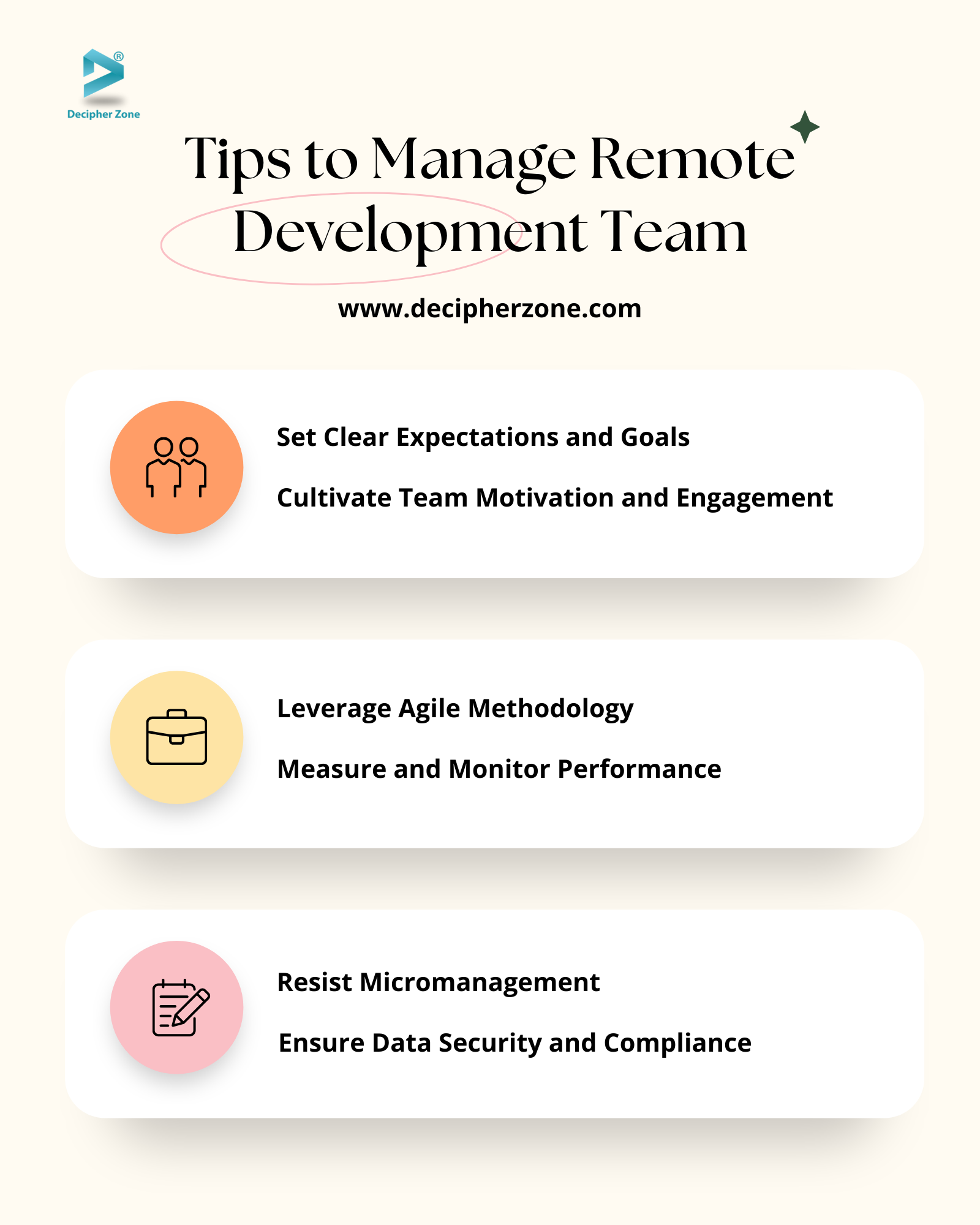How To Effectively Manage A Productive Remote Software Development Team? In the past few years, there has been a significant change in the working landscape worldwide.
Nowadays, hiring remote developers or offshoring teams has become a caliber. However, managing a remote software development team is an uphill battle.
To effectively manage a productive remote team, you should adapt and implement strategies and practices that ensure enhanced productivity and collaboration. To help you out, we will dive into some tips for managing a remote development team.
What is a Remote Software Development Team?
A remote software development team refers to a group of professionals who work from different locations spanning nations, cities, and even continents rather than being co-located in the same office. In remote teams, there is minimal focus on face-to-face or physical interactions as it is entirely virtual.
Read: Tips to Hire Remote Developers
A remote team comprises software development professionals from different cultural backgrounds and time zones. While some businesses shift from an on-site setup to a work-from-home approach, others outsource partners with skillful people to join their teams.
Tips to Manage Remote Development Team
Many challenges are involved in remote development, such as coordinating tasks, allocating resources, keeping track of performance, and more. To help you overcome these fundamental challenges, we have enlisted a few tips and strategies you can follow to make remote software development productive.
Read: The Secret to Secure Software Development
Set Clear Expectations and Goals
One of the most crucial parts for any team to overcome remote team management challenges is setting clear goals and expectations. Without a defined goal, your remote software developers might lose track of what they are working for.
Some expectations you need to define include required availability, working hours, deadlines, communication, project goals, scheduled meetings, and responsiveness.
Read: Ways To Hire Freelance Java Developers
Leverage Agile Methodology
Adopting project management tools and agile methodology can improve collaboration, flexibility, transparency, and productivity in the remote working environment. It also promotes shared understanding, better communication, and goal alignment among teams and stakeholders, leading to project success.
Read: Managing A Distributed Team in Software Development
Some ways you can leverage agile methodology are:
-
Conducting virtual stand-up and sprint meetings regularly to maintain communication and have retrospective sessions.
-
Using project management tools like Asana, Google Meet, and Trello to manage tasks, track progress, and oversee work timelines and priorities.
-
Develop a culture of continuous reflection and improvement among team members.
-
Use tools like Microsoft Teams and Slack for real-time collaboration and communication, ensuring idea and feedback sharing and discussion on challenges.

Resist Micromanagement
Rather than being a micromanager, you should aspire to become a leader. That is, if you are outsourcing a remote software development team, it is advisable to resist the urge to micromanage and trust them to bring your idea to life.
Otherwise, your micromanagement and continuous interference in the work will restrict the remote team’s ability to grow and develop. It will make the team dependent on your directions to perform a task, increasing the time and effort to complete the project.
Read: How to Hire a Dedicated Team of Mobile App Developers
Cultivate Team Motivation and Engagement
For a positive work environment and productivity, it is crucial to keep the remote development team motivated and engaged.
You can do so by encouraging the team to expand skills through webinars, workshops, and training, recognizing team and individual accomplishments through performance-based bonuses, promotions, and public praise, and organizing virtual events like brainstorming sessions and online quizzes to build rapport and strengthen team cohesion.
Read: Remote web developers from agencies vs freelancers
Measure and Monitor Performance
To maintain productivity and ensure the project's success, you should monitor and measure the remote team’s performance. Some ways you can do so include defining clear, relevant, and measurable key performance indicators (KPIs), proactively addressing the underperformance of a developer, executing regular performance reviews, managing different time zones, and offering tools, support, and resources needed to succeed in their roles.
Read: Benefits of Hiring a Software Development Company
Establish a system of in-team technical support
Developers are often heavily specialized. While they may be good at using a programming environment, setting that environment up and troubleshooting it is a different task that’s better handled by a dedicated expert. This can be aided with a remote software installation tool, such as HelpWire.
Once a crew of support technicians has been formed, it’s also important for them to organize their activities. It’s best if the workload is kept even. Additionally, technicians should be able to provide mutual consultation and reassign tasks.
Ensure Data Security and Compliance
In remote team management, data security and compliance are some of the major concerns. Therefore, it is crucial to provide data security training and implement robust security measures that can maintain industry compliance and protect sensitive data from unauthorized access.
A few ways to ensure data security and compliance consist of integrating strong protocols for data security, using secure tools for collaboration, regularly updating the software, fixing bugs, training team members on best security practices, and auditing remote access for unauthorized or suspicious activities.
Read: In-house Development vs Outsourcing
Celebrate Success and Milestones
It is important to acknowledge the contributions and achievements of the team members to boost their morale and motivation. You can do so by celebrating milestones and success through virtual parties or using corporate tools to provide rewards and recognition.
Read: How to Hire a Dedicated Team of React Developers
Conclusion
Remote software development might seem daunting, but with the right strategies and tools, you can easily overcome any challenge outsourcing a remote team involves. You can include shared calendars, video conferencing, messaging, and project management applications that simplify the management process.
So, that was all about effectively managing a remote software development team and making it productive. We hope you find the article helpful and implement the tips when outsourcing a software development team.
Read: Pros and Cons of Nearshore Outsourcing
If you are seeking a remote software development team that can meet your project requirements, then look no further! We at Decipher Zone can help you with just that.
Our seasoned team of professionals has worked on different projects across industries and can help transform your idea into reality. So what are you waiting for? Contact us today!
FAQs: Remote Software Development Team
What is a remote software development team?
A remote software development team refers to a group of professionals who work from different locations spanning nations, cities, and even continents rather than being co-located in the same office.
How do you manage remote teams effectively?
To manage remote teams effectively, you need to set clear expectations and goals from the beginning, leverage agile project management methodology, resist micromanagement, foster motivation and engagement in the team, measure and monitor their performance, and ensure data security and compliance.
How can remote teams be monitored and maintained?
To measure the performance of the remote software development team, you can establish key performance indicators (KPIs), address underperformance, provide regular feedback, and use project management software.

